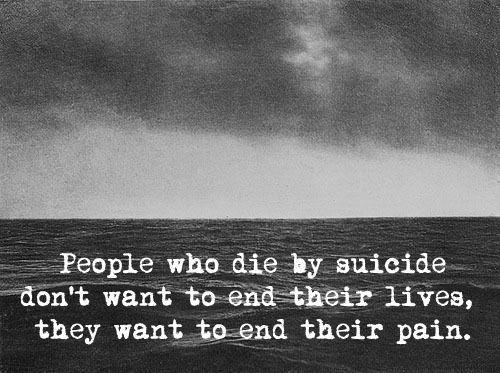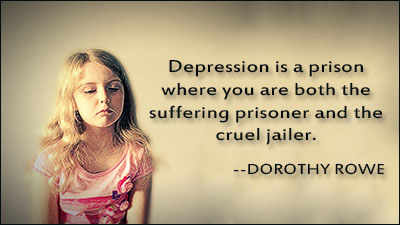
According to Wikipedia, "depression is a state of low mood and aversion to activity that can affect a person's thoughts, behavior, feelings and sense of well-being.People with depressed mood can feel sad, anxious, empty, hopeless, helpless, worthless, guilty, irritable or restless. They may lose interest in activities that were once pleasurable, experience loss of appetite or overeating, have problems concentrating, remembering details or making decisions, and may contemplate, attempt or commit suicide. Insomnia, excessive sleeping, fatigue, aches, pains, digestive problems or reduced energy may also be present."
There has been a lot of ongoing events and so on that has not gone quite the way I expect or hope, in my life as a blogger, a mom, a wife, a friend etc, and all these are in some ways very draining on my soul. Maybe , partly it is because I have ended up with too many things I do not want on my plate eating into my finances, emotions as well as sanity for the past year which has truly been a roller coaster ride of good times and pretty bad ones.

There are so many things that many people do not understand about depression. To some people, depression means you are weak. I have had people telling me that I have a reasonable good life, I should be thankful and there was no need for any depression. Depression was something bad. Yes, of course I am thankful to God and all those around me for the good things I have but depression has always been a close friend of mine too, ever since I was young.

We live in a world where if you break your arm or leg, everyone runs over to sign your cast, but if you tell people you're depressed, everyone runs the other way
Anyway, on doing some research over the internet, I am surprised to find out even depression has a few different kind of depressions...
The most common form of depression? Major depression which you may feel and see symptoms of extreme sadness, hopelessness, low energy, irritability, trouble concentrating, changes in sleep or eating habits, feelings of guilt, physical pain, and thoughts of death or suicide — but to get an official diagnosis, it is said that your symptoms must be for more than two weeks. Sometimes, someone might just experience one episode of major depression, but the condition tends to recur throughout a person's life.
The best treatment is usually with antidepressant medications but talk therapy may also be used to treat depression. And there's good news: An estimated 80 to 90 percent of people with major depression is said to respond well to treatment.

Then there is Dysthymia. Dysthymia is a type of depression that causes a low mood over a long period of time , sometimes for a year or more. People can function adequately, but not optimally. Symptoms include sadness, trouble concentrating, fatigue, and changes in sleep habits and appetite.
This depression usually responds better to talk therapy than to medications, though some studies suggest that combining medication with talk therapy may lead to the greatest improvement. People with dysthymia may also be at risk for episodes of major depression.

A whopping 85 percent of new moms feel sad after having give
birth to their child — but for up to 16 percent of women, that sadness is
serious enough to be diagnosable.
Postpartum depression causes extreme sadness, fatigue,
loneliness, hopelessness, suicidal thoughts, fears about hurting the baby, and
feelings of disconnect from the child. It can occur anywhere from weeks to
months after childbirth, and develops within a year after a woman has given
birth.
It would need fast and experienced medical care that may
include a combination of talk and drug therapy as if not treated, it could be a
threat to the baby. Many postpartum depression mothers have hurt their babies,
committed suicide and so on.

There is also the seasonal affective disorder, or SAD, but
as Malaysians we probably do not go through that. SAD is characterized by symptoms of anxiety,
increased irritability, daytime fatigue, and weight gain. This form of depression
typically occurs in winter climates, likely due to the lessening of natural
sunlight. There are some people are more sensitive to this reduction in light
and the symptoms are usually mild, though they can be severe.
This depression usually starts in early winter and lifts in
the spring, and it can be treated with light therapy or artificial light
treatment. Strange huh? But it happens.
Then there is the Atypical Depression: quite a misunderstood
form of depression which is not unusual but it is one of the most common types
of depression — and some doctors even believe it is underdiagnosed.

This type of depression is less well understood than major
depression, because it causes is a sense of heaviness in the arms and legs —
like a form of paralysis. However, a study published in the Archives of General
Psychiatry (now known as JAMA Psychiatry) found that oversleeping and
overeating are the two most important symptoms for diagnosing atypical
depression. People with the condition may also gain weight, be irritable, and
have relationship problems.
Some studies show that talk therapy works well to treat this
kind of depression. Could this be my kind of depression? I do not really know.
Because of late, I have been falling asleep in the weirdest situations
sometimes, and I suffer aches and pains plus heaviness in my arms, my right
shoulder hurts most of the time….
Psychosis — a mental state characterized by false beliefs,
known as delusions, or false sights or sounds, known as hallucinations —
doesn't typically get associated with depression. But according to the National
Alliance on Mental Illness, about 20 percent of people with depression have
episodes so severe that they actually see or hear things that are not really
there. This is also a dangerous type of depression as many murderers always
suffer from this, and it causes them to do things beyond their comprehension.
"People with this psychotic depression may become
catatonic, not speak, or not leave their bed," explained Halaris.
Treatment may require a combination of antidepressant and antipsychotic medications.
A review of 10 studies concluded that it may be best to start with an
antidepressant drug alone and then add an antipsychotic drug if needed.Another
review, however, found the combination of medications was more effective than
either drug alone in treating psychotic depression

If your periods of extreme lows are followed by periods of
extreme highs, you could have bipolar disorder (sometimes called manic
depressive disorder because symptoms can alternate between mania and
depression).
Symptoms of mania include high energy, excitement, racing
thoughts, and poor judgment. Symptoms happens between depression and mania a
few times per year or much more rapidly. This disorder affects about 2 to 3
percent of the population and has one of the highest risks for suicide. Bipolar
disorder has four basic subtypes: bipolar I (characterized by at least one
manic episode); bipolar II (characterized by hypomanic episodes — which are
milder — along with depression); cyclothymic disorder; and other specified
bipolar and related disorder.
People with bipolar disorder are typically treated with
drugs called mood stabilizers.

Premenstrual dysphoric disorder, or PMDD, is a type of
depression that affects women during the second half of their menstrual cycles.
Symptoms include depression, anxiety, and mood swings. Unlike premenstrual
syndrome (PMS), which affects up to 85 percent of women and has milder
symptoms, PMDD affects about 5 percent of women and is much more severe.
PMDD can be severe enough to affect a woman's relationships
and her ability to function normally when symptoms are active. Treatment could
include a combination of depression drugs as well as talk and nutrition
therapies.
Lastly, there is the situational depression. Also called
adjustment disorder, situational depression is often caused by a stressful or
life-changing event, such as job loss, the death of a loved one, trauma — even
a bad breakup.

Situational depression is about three times more common than
major depression, and medications are rarely needed — that's because it tends
to clear up over time once the event has ended. It should NOT be brushed off. Symptoms of situational depression are usually excessive
sadness, worry, or nervousness, and if they don't go away, they may become
warning signs of major depression.
I will share about tips on how I overcome depression but for now, I keep myself busy with my favourite books , music, games and other activities to keep all those sad and stressful thoughts at bay... and don't worry, I will bounce back as usual....like I said, depression is my close friend since childhood and he is just here for a short visit and will be off again to bother other 'friends' of his...


agree with depression is not bad, but is time to appreciate who are always beside you.
ReplyDeleteLove You!
thanks Wendy... appreciate your caring and friendship.... Love you too
Deletedepression happen to ladies often.. its important to have loved one to support us.. when we are down.. cheers
ReplyDelete